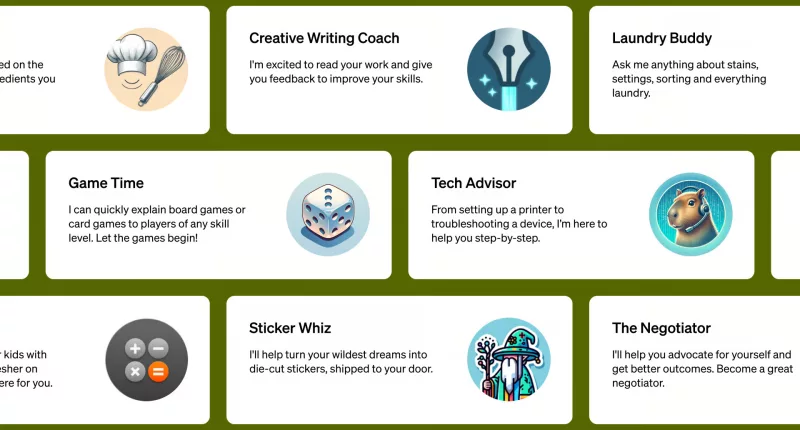Almost a year ago, OpenAI set the ball rolling — in a big way — on generative AI with the launch of ChatGPT, the chatbot which has – since then – become a household name and paved the way for the accelerated advancements in the rapidly-growing AI sector. Now, it seems that CEO Sam Altman and other execs are celebrating ChatGPT’s first birthday a few weeks early with the rollout of GPTs – a new platform which would allow users to create custom versions of ChatGPT.
The announcement was made during OpenAI’s 2023 DevDay keynote address. These GPTs are tailored versions of ChatGPT that serve specific purposes. Much like the single-purpose apps and features on your smartphone, GPTs are task-specific iterations of ChatGPT. However, instead of maintaining a simple timer or a digital assistant for transcribing voice instructions, GPTs can be trained to perform a wide range of tasks based on user preferences. In a nutshell, GPTs come as an expansion of the Custom Instructions feature, which was released a few months ago, which leads users customize their ChatGPT experience by adding personal instructions to the prompts. Each GPT can be granted access to web browsing, DALL-E, and OpenAI’s Code Interpreter tool for writing and executing software.
GPTs are a new way for anyone to create a tailored version of ChatGPT to be more helpful in their daily life, at specific tasks, at work, or at home — and then share that creation with others. No code required. https://t.co/SPV4TcMiQw pic.twitter.com/PcmorZwtMF
— OpenAI (@OpenAI) November 6, 2023
Pretty much like ChatGPT, chats with custom GPTs remain confidential and are not shared with GPT builders. Users can decide whether their data can be sent to third-party APIs. OpenAI has implemented systems to ensure GPTs adhere to usage policies, preventing the spread of harmful content or activities. “Later this month, we’re launching the GPT Store, featuring creations by verified builders. Once in the store, GPTs become searchable and may climb the leaderboards. We will also spotlight the most useful and delightful GPTs we come across in categories like productivity, education, and “just for fun”. In the coming months, you’ll also be able to earn money based on how many people are using your GPT,” OpenAI noted, while Altman said that the company will “pay people who make the most used and most useful GPTs with a portion of our revenue.”
One of the key advantages of GPTs is the user-friendly approach to customization. Users don’t need extensive coding knowledge to create their custom AI assistants. They can interact with the AI model using natural language, eliminating the coding barrier. “Anyone can easily build their own GPT—no coding is required. You can make them for yourself, just for your company’s internal use, or for everyone. Creating one is as easy as starting a conversation, giving it instructions and extra knowledge, and picking what it can do, like searching the web, making images or analyzing data,” OpenAI noted in its blog post.
GPTs will also offer integration with external services, OpenAI noted, and this can greatly enhance their capabilities, for accessing data like emails, databases, and more, starting with Canva and Zapier. Users can connect GPTs to translation APIs, access databases, interact with emails, and more. This flexibility allows GPTs to serve a wide range of functions, making them valuable tools for various tasks. Starting Wednesday, users of ChatGPT Enterprise will be able to design and deploy internal-only GPTs. The admin console lets them choose how GPTs are shared and whether external GPTs may be used inside their businesses. And if this is not enough, OpenAI is also set to launch the GPT Store, a platform where users can share their custom GPTs with the community. This marketplace will offer creators the opportunity to monetize their AI assistants. While users can share their GPTs directly, the GPT Store provides a centralized space for sharing and accessing these custom AI assistants.
